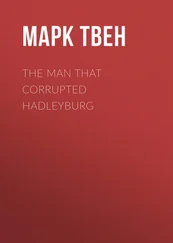Mark Twain - The Man That Corrupted Hadleyburg and Other Stories
Здесь есть возможность читать онлайн «Mark Twain - The Man That Corrupted Hadleyburg and Other Stories» весь текст электронной книги совершенно бесплатно (целиком полную версию без сокращений). В некоторых случаях можно слушать аудио, скачать через торрент в формате fb2 и присутствует краткое содержание. Год выпуска: 2004, Жанр: Классическая проза, Юмористическая проза, на английском языке. Описание произведения, (предисловие) а так же отзывы посетителей доступны на портале библиотеки ЛибКат.
- Название:The Man That Corrupted Hadleyburg and Other Stories
- Автор:
- Жанр:
- Год:2004
- ISBN:нет данных
- Рейтинг книги:4 / 5. Голосов: 1
-
Избранное:Добавить в избранное
- Отзывы:
-
Ваша оценка:
- 80
- 1
- 2
- 3
- 4
- 5
The Man That Corrupted Hadleyburg and Other Stories: краткое содержание, описание и аннотация
Предлагаем к чтению аннотацию, описание, краткое содержание или предисловие (зависит от того, что написал сам автор книги «The Man That Corrupted Hadleyburg and Other Stories»). Если вы не нашли необходимую информацию о книге — напишите в комментариях, мы постараемся отыскать её.
The Man That Corrupted Hadleyburg and Other Stories — читать онлайн бесплатно полную книгу (весь текст) целиком
Ниже представлен текст книги, разбитый по страницам. Система сохранения места последней прочитанной страницы, позволяет с удобством читать онлайн бесплатно книгу «The Man That Corrupted Hadleyburg and Other Stories», без необходимости каждый раз заново искать на чём Вы остановились. Поставьте закладку, и сможете в любой момент перейти на страницу, на которой закончили чтение.
Интервал:
Закладка:
III
Under the powerful influence of the near treatment and the absent treatment together, my bones were gradually retreating inward and disappearing from view. The good word took a brisk start, now, and went on quite swiftly. My body was diligently straining and stretching, this way and that, to accommodate the processes of restoration, and every minute or two I heard a dull click inside and knew that the two ends of a fracture had been successfully joined. This muffled clicking and gritting and grinding and rasping continued during the next three hours, and then stopped—the connections had all been made. All except dislocations; there were only seven of these: hips, shoulders, knees, neck; so that was soon over; one after another they slipped into their sockets with a sound like pulling a distant cork, and I jumped up as good as new, as to framework, and sent for the horse-doctor.
I was obliged to do this because I had a stomach-ache and a cold in the head, and I was not willing to trust these things any longer in the hands of a woman whom I did not know, and in whose ability to successfully treat mere disease I had lost all confidence. My position was justified by the fact that the cold and the ache had been in her charge from the first, along with the fractures, but had experienced not a shade of relief; and indeed the ache was even growing worse and worse, and more and more bitter, now, probably on account of the protracted abstention from food and drink.
The horse-doctor came, a pleasant man and full of hope and professional interest in the case. In the matter of smell he was pretty aromatic, in fact quite horsey, and I tried to arrange with him for absent treatment, but it was not in his line, so out of delicacy I did not press it. He looked at my teeth and examined my hock, and said my age and general condition were favourable to energetic measures; therefore he would give me something to turn the stomach-ache into the botts and the cold in the head into the blind staggers; then he should be on his own beat and would know what to do. He made up a bucket of bran-mash, and said a dipperful of it every two hours, alternated with a drench with turpentine and axle-grease in it, would either knock my ailments out of me in twenty-four hours or so interest me in other ways as to make me forget they were on the premises. He administered my first dose himself, then took his leave, saying I was free to eat and drink anything I pleased and in any quantity I liked. But I was not hungry any more, and did not care for food.
I took up the 'Christian Scientist' book and read half of it, then took a dipperful of drench and read the other half. The resulting experiences were full of interest and adventure. All through the rumblings and grindings and quakings and effervescings accompanying the evolution of the ache into the botts and the cold into the blind staggers I could note the generous struggle for mastery going on between the mash and the drench and the literature; and often I could tell which was ahead, and could easily distinguish the literature from the others when the others were separate, though not when they were mixed; for when a bran-mash and an eclectic drench are mixed together they look just like the Apodictical Principle out on a lark, and no one can tell it from that. The finish was reached at last, the evolutions were complete and a fine success; but I think that this result could have been achieved with fewer materials. I believe the mash was necessary to the conversion of the stomach-ache into the boots, but I think one could develop the blind staggers out of the literature by itself; also, that blind staggers produced in this way would be of a better quality and more lasting than any produced by the artificial processes of a horse-doctor.
For of all the strange, and frantic, and incomprehensible, and uninterpretable books which the imagination of man has created, surely this one is the prize sample. It is written with a limitless confidence and complacency, and with a dash and stir and earnestness which often compel the effects of eloquence, even when the words do not seem to have any traceable meaning. There are plenty of people who imagine they understand the book; I know this, for I have talked with them; but in all cases they were people who also imagined that there were no such things as pain, sickness, and death, and no realities in the world; nothing actually existent but Mind. It seems to me to modify the value of their testimony. When these people talk about Christian Science they do as Mrs. Fuller did; they do not use their own language, but the book's; they pour out the book's showy incoherences, and leave you to find out later that they were not originating, but merely quoting; they seem to know the volume by heart, and to revere it as they would a Bible—another Bible, perhaps I ought to say. Plainly the book was written under the mental desolations of the Third Degree, and I feel sure that none but the membership of that Degree can discover meanings in it. When you read it you seem to be listening to a lively and aggressive and oracular speech delivered in an unknown tongue, a speech whose spirit you get but not the particulars; or, to change the figure, you seem to be listening to a vigorous instrument which is making a noise it thinks is a tune, but which to persons not members of the band is only the martial tooting of a trombone, and merely stirs the soul through the noise but does not convey a meaning.
The book's serenities of self-satisfaction do almost seem to smack of a heavenly origin—they have no blood-kin in the earth. It is more than human to be so placidly certain about things, and so finely superior, and so airily content with one's performance. Without ever presenting anything which may rightfully be called by the strong name of Evidence, and sometimes without even mentioning a reason for a deduction at all, it thunders out the startling words, 'I have Proved' so and so! It takes the Pope and all the great guns of his church in battery assembled to authoritatively settle and establish the meaning of a sole and single unclarified passage of Scripture, and this at vast cost of time and study and reflection, but the author of this work is superior to all that: she finds the whole Bible in an unclarified condition, and at small expense of time and no expense of mental effort she clarifies it from lid to lid, reorganises and improves the meanings, then authoritatively settles and establishes them with formulae which you cannot tell from 'Let there be light!' and 'Here you have it!' It is the first time since the dawn-days of Creation that a Voice has gone crashing through space with such placid and complacent confidence and command.
IV
A word upon a question of authorship. Not that quite; but, rather, a question of emendation and revision. We know that the Bible-Annex was not written by Mrs. Eddy, but was handed down to her eighteen hundred years ago by the Angel of the Apocalypse; but did she translate it alone, or did she have help? There seems to be evidence that she had help. For there are four several copyrights on it—1875, 1885, 1890, 1894. It did not come down in English, for in that language it could not have acquired copyright—there were no copyright laws eighteen centuries ago, and in my opinion no English language—at least up there. This makes it substantially certain that the Annex is a translation. Then, was not the first translation complete? If it was, on what grounds were the later copyrights granted?
I surmise that the first translation was poor; and that a friend or friends of Mrs. Eddy mended its English three times, and finally got it into its present shape, where the grammar is plenty good enough, and the sentences are smooth and plausible though they do not mean anything. I think I am right in this surmise, for Mrs. Eddy cannot write English to-day, and this is argument that she never could. I am not able to guess who did the mending, but I think it was not done by any member of the Eddy Trust, nor by the editors of the 'Christian Science Journal,' for their English is not much better than Mrs. Eddy's.
Читать дальшеИнтервал:
Закладка:
Похожие книги на «The Man That Corrupted Hadleyburg and Other Stories»
Представляем Вашему вниманию похожие книги на «The Man That Corrupted Hadleyburg and Other Stories» списком для выбора. Мы отобрали схожую по названию и смыслу литературу в надежде предоставить читателям больше вариантов отыскать новые, интересные, ещё непрочитанные произведения.
Обсуждение, отзывы о книге «The Man That Corrupted Hadleyburg and Other Stories» и просто собственные мнения читателей. Оставьте ваши комментарии, напишите, что Вы думаете о произведении, его смысле или главных героях. Укажите что конкретно понравилось, а что нет, и почему Вы так считаете.










